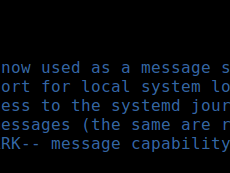This is a log-consolidation scenario. There exist at least two systems, a server and at least one client. The server is meant to gather log data from all the clients. Clients may (or may not) process and store messages locally. If they do, doesn’t matter here. See recipe Sending Messages to a Remote Syslog Server for how to configure the clients.
Messages from remote hosts in the 192.0.1.x network shall be written to one file and messages from remote hosts in the 192.0.2.x network shallbe written to another file.
Things to think about
TCP recpetion is not a build-in capability. You need to load the imtcp plugin in order to enable it. This needs to be done only once in rsyslog.conf. Do it right at the top.
Note that the server port address specified in $InputTCPServerRun must match the port address that the clients send messages to.
Config Statements
$ModLoad imtcp
$InputTCPServerRun 10514
# do this in FRONT of the local/regular rules
if $fromhost-ip startswith '192.0.1.' then /var/log/network1.log
& ~
if $fromhost-ip startswith '192.0.2.' then /var/log/network2.log
& ~
# local/regular rules, like
*.* /var/log/syslog.log
How it works
It is important that the rules processing the remote messages come before any rules to process local messages. The if’s above check if a message originates on the network in question and, if so, writes them to the appropriate log. The next line (“& ~”) is important: it tells rsyslog to stop processing the message after it was written to the log. As such, these messages will not reach the local part. Without that “& ~”, messages would also be written to the local files.
Also note that in the filter there is a dot after the last number in the IP address. This is important to get reliable filters. For example, both of the addresses “192.0.1.1” and “192.0.10.1” start with “192.0.1” but only one actually starts with “192.0.1.”!
本文链接:https://kinber.cn/post/1363.html 转载需授权!
推荐本站淘宝优惠价购买喜欢的宝贝:

 支付宝微信扫一扫,打赏作者吧~
支付宝微信扫一扫,打赏作者吧~


